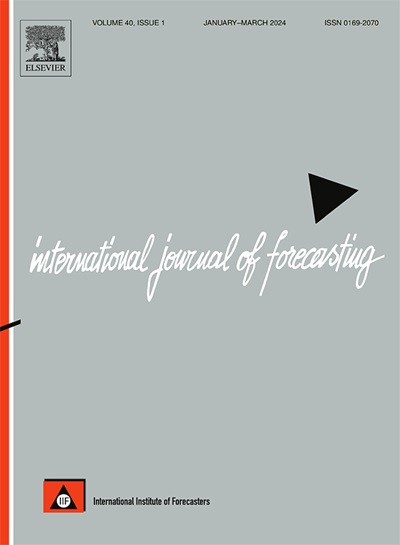概率预测的自适应波动率方法及其在M6金融预测竞赛中的应用
IF 7.1
2区 经济学
Q1 ECONOMICS
引用次数: 0
摘要
本文采用基于经典时变波动率模型的自适应波动率方法,利用在线随机优化算法解决了概率预测问题。这些原理在AdaGaussMC团队的M6预测竞赛中得到了成功的应用。我们的方法采用了一条独特的道路,即采用有效市场假说(EMH),而不是试图直接击败市场。我们专注于评估有效市场,并强调在线预测在适应金融市场动态特性方面的重要性。我们方法的三个关键点是:(a)应用单变量时变波动率模型AdaVol, (b)获得未来收益的概率预测,(c)使用基于随机梯度的算法优化竞争指标。我们认为,我们方法的简单性有助于其稳健性和一致性。我们在M6比赛中的表现使我们获得了综合第七名,在预测任务中获得了第五名。考虑到我们的方法的简单性,这一成就强调了我们的自适应波动率方法在概率预测中的有效性。本文章由计算机程序翻译,如有差异,请以英文原文为准。
An adaptive volatility method for probabilistic forecasting and its application to the M6 financial forecasting competition
In this paper, we address the problem of probabilistic forecasting using an adaptive volatility method rooted in classical time-varying volatility models and leveraging online stochastic optimization algorithms. These principles were successfully applied in the M6 forecasting competition under the team named AdaGaussMC. Our approach takes a unique path by embracing the Efficient Market Hypothesis (EMH) instead of trying to beat the market directly. We focus on evaluating the efficient market and emphasize the importance of online forecasting in adapting to the dynamic nature of financial markets. The three key points of our approach are: (a) apply the univariate time-varying volatility model AdaVol, (b) obtain probabilistic forecasts of future returns, and (c) optimize the competition metrics using stochastic gradient-based algorithms. We contend that the simplicity of our approach contributes to its robustness and consistency. Our performance in the M6 competition resulted in an overall 7th place, with a 5th place in the forecasting task. Considering our approach’s perceived simplicity, this achievement underscores the efficacy of our adaptive volatility method in probabilistic forecasting.
求助全文
通过发布文献求助,成功后即可免费获取论文全文。
去求助
来源期刊

International Journal of Forecasting
Multiple-
CiteScore
17.10
自引率
11.40%
发文量
189
审稿时长
77 days
期刊介绍:
The International Journal of Forecasting is a leading journal in its field that publishes high quality refereed papers. It aims to bridge the gap between theory and practice, making forecasting useful and relevant for decision and policy makers. The journal places strong emphasis on empirical studies, evaluation activities, implementation research, and improving the practice of forecasting. It welcomes various points of view and encourages debate to find solutions to field-related problems. The journal is the official publication of the International Institute of Forecasters (IIF) and is indexed in Sociological Abstracts, Journal of Economic Literature, Statistical Theory and Method Abstracts, INSPEC, Current Contents, UMI Data Courier, RePEc, Academic Journal Guide, CIS, IAOR, and Social Sciences Citation Index.
 求助内容:
求助内容: 应助结果提醒方式:
应助结果提醒方式:


